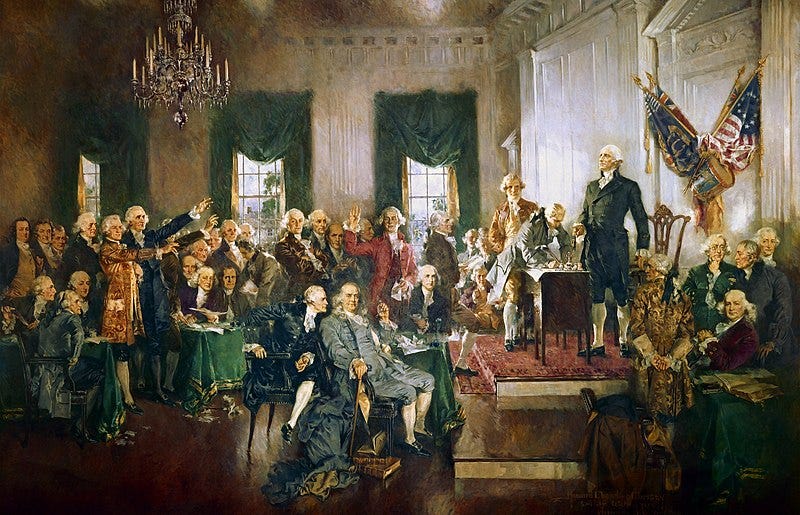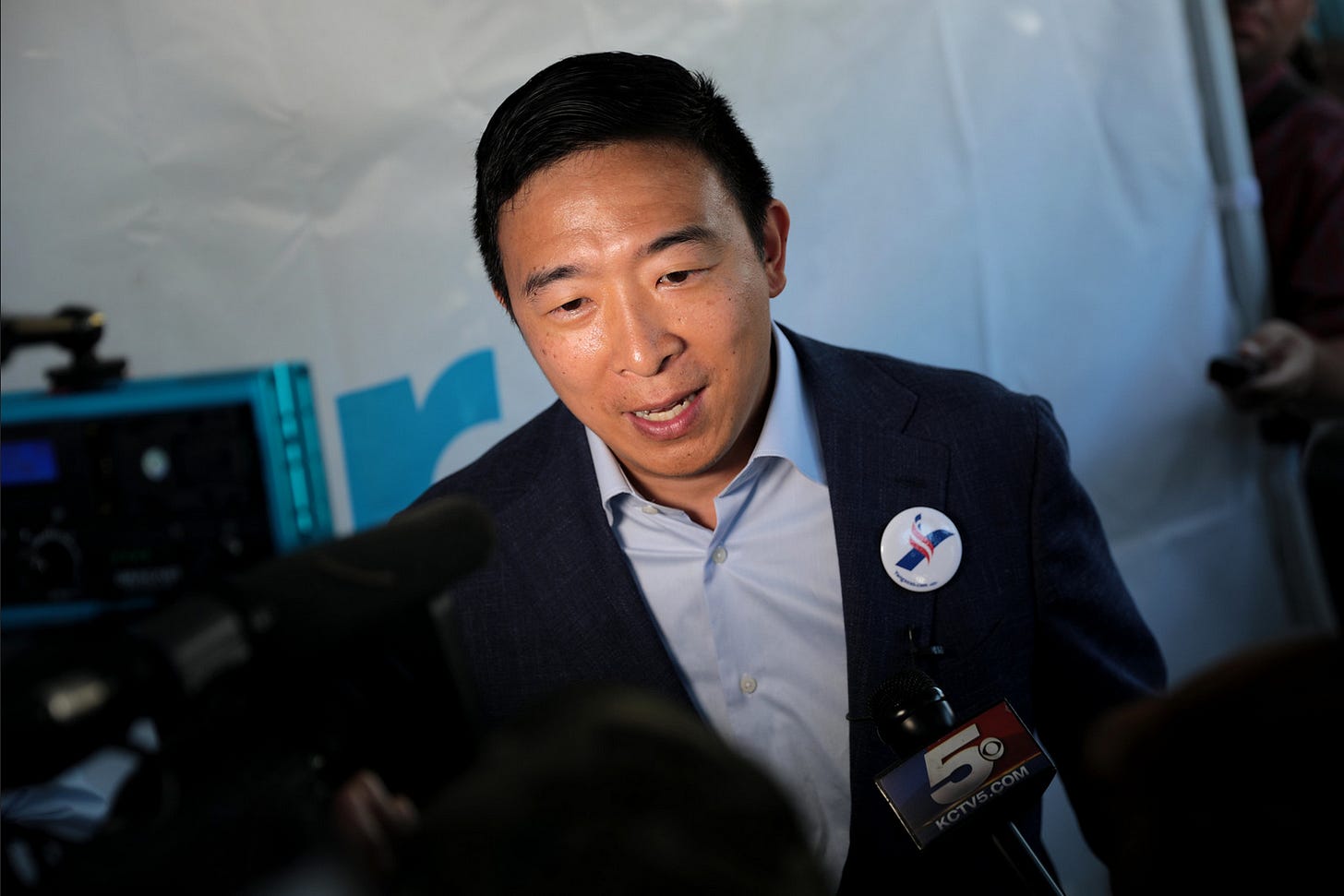Abandon Your Party, Not Your Country
America's first president warned us where political parties would lead to in his farewell address.
America’s first president George Washington feared one thing which he viewed as a threat to the integrity of our republic’s integrity more so than any other.
In his 1796 farewell address, Washington ended his days in public service with a stark warning about the dangers that strong political parties posed to America’s founding principles of liberty and democracy:
“[Political parties] are likely in the course of time and things, to become potent engines, by which cunning, ambitious, and unprincipled men will be enabled to subvert the power of the people to usurp for themselves the reins of government, destroying afterwards the very engines which have lifted them to unjust dominion.” — President George Washington

The American people are becoming more independent, but our government is increasingly captured by partisan actors.
The president had written a draft of this address in 1792, intending to retire after one term.
Instead, he opted to run for a second term as it became clear to him that factionalism between the Federalist Party and the Democratic-Republican Party—America’s first two political parties—threatened the young republic’s stability.
Washington remained an independent through his two terms in office. Although his two-term standard was upheld for more than a hundred years, his standard of independence did not last.
Presidents John Adams and Thomas Jefferson criticized parties after his departure, though both of these men chose to join one, thus rejecting his early precedent of non-partisanship.
In 1780, decades before taking the oath of office, President Adams wrote in a letter that he regarded a “division of the republic into two great parties” as the “greatest political evil” which could come to pass under the Constitution.
Americans in the 21st century appear to share Washington’s conviction in independence over partisanship.
Since 2010, a clear plurality of the American public has rejected the labels of both major parties and chosen to identify as independent. Americans are increasingly convinced that elected officials pledge allegiance to their party over their country.
The Democratic and Republican parties of the 21st century engage their supporters not with calls to unite a fractured nation behind a shared future, but by inciting fear and espousing disdain for members of the other party.
Those who are encouraged to join the parties and run for office are those who are capable of enduring the partisan arena, not solving America’s problems.
The political environment today reflects a course that Washington deeply feared would lead to an erosion of our founding principles. The American people are becoming more independent, but our government is increasingly captured by partisan actors.

Andrew Yang is an unlikely figure to lead the charge against America’s institutionalized two-party system.
The son of Taiwanese immigrants, Yang often jokes that his family never told him that going into politics was even an option.
Through his years-long journey diving into American politics, he believes that he has gained clear perspective on the complicated problems in front of us and the solutions that they demand.
As the founder of the Forward Party, he has sought to dispel any notions that the party is a launching ground for his own political ambitions. He has emphasized that his focus is on building a lasting new party, not a 2024 presidential campaign. The Forward Party does not plan to nominate a presidential candidate in 2024.
Yang described the 2016 election as a red flag that Americans had lost a tremendous amount of faith in our republic.
While writing his 2018 book ‘The War on Normal People,’ he discovered a troubling phenomenon that was occurring seemingly unnoticed by politicians and the media.
The automation of manufacturing jobs means that an increasing number of rural Americans are being left behind in the 21st century economy.
Economic displacement shows signs of reaching into more U.S. industries, including food service and retail. The economic shock waves of the post-pandemic world have only pushed businesses to automate their work more quickly.
Among these Americans left behind by the wave of automation, Donald Trump’s promises to bring back manufacturing jobs struck a chord. Hillary Clinton’s claims that “America never stopped being great” rang hollow to the people whose fortunes had worsened, not brightened.
Yang discovered that the disconnect between what was happening in peoples’ lives and what politicians were focusing on was more stark than many would care to admit.
He took this discovery and launched a long-shot campaign for president motivated by his desire to bring automation and universal basic income to the front of Americans’ minds.
Although Yang and his ideas were launched from obscurity to the center of the national stage, the one-time lawyer ended his campaign after the second primary contest.
Yang explains in his post-2020 memoir ‘Forward’ how he came to the conclusion that the problem with American politics isn’t that the wrong ideas are being proposed.
He argues that the system is working just as it is designed to. The institutions of our republic have been so degraded that they work more for partisan and special interests than for the people.
Voting reform (ranked-choice voting, approval voting, or STAR voting), nonpartisan primaries, and independent redistricting commissions are the key pillars of the new Forward Party. Yang contends that these reforms will remove the most significant barriers to third party success.
The argument for each of these reforms revolves around reintroducing competition into elections, and the Forward Party has a plan to pass them that does not require buy-in from elected Democratic or Republican officials.
Meanwhile, several states have already moved to ban RCV, including Florida and Tennessee.
The key that holds back independents and third party candidates is a belief among Americans that voting for someone outside the two major parties is, at least, a waste of a vote, and at worst, a benefit to the major party candidate they most dislike.
Electoral reform aims to eliminate this problem.
Ranked-choice voting offers voters the assurance that they can cast a ballot for whomever they want without “spoiling” an election. Non-partisan primaries take this a step further by eliminating closed party primaries, instead having candidates of all parties run together in one primary.
These two steps, according to Yang and Forwardists, will move America firmly in the direction of depolarization and independence from partisan allegiance. They also more closely reflect President Washington’s vision for the country than our system has for many years.
The final element of the Forward Party’s plan answers the question of how these goals can be accomplished given the intensity of partisan gridlock.
Since 2016, Alaska and Maine have implemented ranked-choice voting (RCV) statewide after citizen-initiated ballot measures passed. Alaska passed non-partisan primaries as well.
Citizen-initiated ballot measures can pass legislation without having to rely on a gridlocked Congress, and twenty-four states allow ballot measures.
The Nevada Supreme Court ruled in June that citizen-initiated measures for RCV and non-partisan primaries will be allowed to appear on the ballot in November, putting the state at the center of the Forward Party’s new approach.
Americans should heed President Washington’s warning that the environment we find ourselves in today is dire.
His greatest shortcoming may have been his failure to erect stronger guardrails against the power of partisanship.
The Forward Party’s vision offers a pragmatic proposal to more fully realize the vision of our first president than other modern third party movement thus far have.
The Union Forward newsletter is published under The Daily Independent: An Independent Report for Independent Thinkers.
Sources
From John Adams to Jonathan Jackson, 2 October 1780 — National Archives
President George Washington’s Farewell Address, 19 September 1796 — National Archives
States with initiatives or referendum — Ballotpedia
US Political Party Preferences Shifted Greatly During 2021 — Gallup Polling



